Interviewed and Written by Patrick Mc Gavin 8/08, Edited by Larry Lynch ’75
FATHER MAURICE LEAHY ’45
The great transcendentalist Ralph Waldo Emerson famously observed that things are in the saddle and ride mankind. The nature of most people’s experiences is to read it, see it, learn about it, and then find out on their own how they personally relate to events and activities that float and whir in their own consciousness.
Chance and happenstance, the strange, even ineluctable ways situations and acts shape our lives, have an pleasing, direct, even insistent way of following us. Even birth dates play a part. A day, a year, seems in the wider picture to have no great significance except for the people, the families, involved. For others, to be born on the same day a year apart was strikingly sometimes a question of innocence and freedom or death.
Maurice Joseph Leahy witnessed it first hand. The youngest of eight children of Irish émigrés, he was born in 1927. He entered Leo High School in the fall of 1941, just weeks before the Japanese bombing attack at Pearl Harbor precipitated America’s entry into World War II. No matter how far removed, high school retains a sense of the flair and flamboyant, a vivid sense of life lived and choices made and experiences and fun pursued. For the young men that entered the high school that fall, they suddenly took on a darker edge. School provides a sense of structure, of order and relief. It enables many young people to find their vocation and develop their sensibility of who and what they are.
They were men whose every day of class existed under a dark cloud, the daily pounding reality of the largest global war in the history of civilization. If high school is bound by a strong sense of the free and untrammeled, of shielding those from the bleaker recesses of life and existence, that sense of normalcy was not possible for the young Leo men whose classroom activity, intellectual pursuits, theological grounding or athletic excellence would be constantly obscured by the daily actions in Western Europe, Africa and Asia. What stared down these young men was not the prospect of college, working, starting families but defending American freedom and democracy against the fascist war empires of Germany and Japan.
“In the class of 1944, the class just a year ahead of me, we had six kids killed in the war. They graduated in June and most of them were dead by December,” he says. As the days approached his own graduation, he ended his prayers every night by declaring he was ready to enter the armed services or if the war were over, the priesthood.
He has been an ordained priest for 53 years. Fr. Leahy has given comfort and counseling to a great many people of widely disparate tendencies, actions and behavior. If the nature of high school is to learn who and what we are, Fr. Leahy witnessed a more urgent and visceral brand of spiritual recognition.
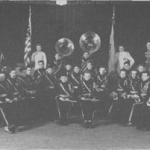 History is a nightmare from which I am trying to awake, observes a character in Ulysses, the supreme masterwork of Irish novelist James Joyce. Another great Irish writer, the American playwright Eugene O’Neill observed for the Irish, life is removed of any present or future tense; life is an accumulation of the past occurring again and again.
History is a nightmare from which I am trying to awake, observes a character in Ulysses, the supreme masterwork of Irish novelist James Joyce. Another great Irish writer, the American playwright Eugene O’Neill observed for the Irish, life is removed of any present or future tense; life is an accumulation of the past occurring again and again.
His parents both grew up in the Irish countryside and came to America at the turn of the 20th century. (Interestingly his mother’s maiden name was also Leahy). He was the youngest of eight children. His father, John, was born in 1894. After coming to America, he worked as a longshoreman on the docks and he worked at the post office. “My dad was a police sergeant during the 1919 race riots. One time, they brought a black man into the station and a mob gathered outside. There were only two or three policemen in the entire station. He stood on the front steps, and he said, in an Irish brogue, ‘Any man that steps in front of that line, I’m going to shoot.’
“He saved a man’s life.”
The great paradox
“I grew up in the St. Leo Parish,” Fr. Leahy says. “I went to St. Leo grade school. The neighborhood was very Catholic. My oldest brothers were 10, 12 years older than me. The pastor at St. Leo actually founded Leo High School and then he invited the Christian Brothers to teach there. Leo was founded originally as a parish high school. The St. Leo parishioners were the ones who built it; it was our money that built it. The very first year it opened, they invited kids from all Catholic schools to come.
“I went to St. Leo grade school. Almost everybody went from the grade school to the high school,” he says. The nexus of the parish was 75th and Halsted. Fr. Leahy’s three older brothers all attended Leo. Even looking back from the perspective of nearly seven decades, it is not necessary to soften the social and political portrait. His childhood innocence was itself a kind of mirage, shattered by the nightmarish economic conditions of the Depression. Franklin Roosevelt’s New Deal economic stimulus intended to ignite the economy. Those caught in the vortex found it virtually impossible to escape.
“My older brothers were all caught deeply in the Depression,” Fr. Leahy says. “They had very poor jobs, if any jobs at all. My second oldest brother was drafted about six months before the [American involvement in the] war started. In my high school days, I worked summers; I made ten times more in the summers than my poor brothers did the whole year. There was a big contrast between wage earnings back then. My brother Bill made five dollars a week working at a movie theater. I made a dollar and a half an hour working for the post office.”
post office.”
As a young boy, Fr. Leahy acknowledged the great paradox. Immediately following the surprise Japanese attack on Dec. 7, Roosevelt’s government declared war against Germany and Japan. Virtually overnight the massive infrastructure of the armed services were mobilized. The massive mobilization and build up ignited the lethargic economy. It also instantly increased demand at home for workers as most men working-age men were inducted into the armed services. “All three of my brothers were in the service during the war,” Fr. Leahy says. “They were on the fringes; they never got into combat.”
Fr. Leahy recalls vividly the strange sensation of being at home during a time of unprecedented national upheaval. “It was great years for Leo. We had great football and basketball teams. Most of us were working because of the war effort. Everybody over 18 was gone. I drove mail trucks during the summer in the war. Everybody had good jobs, and you worked after school as well. There was a lot of work. There was closeness at Leo during the time; our older brothers were gone and were very eager to get into the war. There was a great desire to be there and get into the front lines.”
As a young man, Fr. Leahy was a thin-faced, handsome man with an evocative and expressive smile. He liked sports, but he was a tad small and he only participated in the school intramurals. The Depression and the war had sidetracked his older brothers’ career plans; none of the three had attended college. The war gripped his imagination. He didn’t think about college, either. It was a big deal just to graduate from high school for Irish families, he says. At Leo, he was always impressed with the religious nature of the teaching. He still recalls how on Mass on First Friday, the range and lustrous voices that sang out.
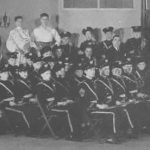 In the collective conscious, the portrait of the war at home is often one of solidarity, community and togetherness. The war was simultaneously paralyzing and liberating. It gave Fr. Leahy and his friends tremendous personal freedom to find their niche and discover themselves. The intensity of the conflict abroad had strange consequences at home; namely, Fr. Leahy says, there was an almost perverse lack of parental enforcement. “I loved Leo, but I didn’t really apply myself academically or to studying very hard during those years. We were all involved in other things.”
In the collective conscious, the portrait of the war at home is often one of solidarity, community and togetherness. The war was simultaneously paralyzing and liberating. It gave Fr. Leahy and his friends tremendous personal freedom to find their niche and discover themselves. The intensity of the conflict abroad had strange consequences at home; namely, Fr. Leahy says, there was an almost perverse lack of parental enforcement. “I loved Leo, but I didn’t really apply myself academically or to studying very hard during those years. We were all involved in other things.”
He remembers the social events of St. Sabina. “I worked at Spiegel’s after school. They had a great big factory at 35th Street, and we prepared to have stuff shipped off in the catalogue. A couple of us had jobs at an engineering building in the Loop. We were the junior janitors. There were all sorts of jobs available. At Christmas and the summer, I worked at the post office.”
Fr. Leahy and his friends stayed constantly alert to European and Pacific theaters. They kept abreast of the invasions and the major campaigns in Africa and Sicily that indicated the first significant shift in favor of the Allied forces. Just days after classes for his junior year ended, in June 1944, the Normandy invasion signaled the inevitable. “The war was coming to an end. We looked forward to that, but we also did not want to miss it either. We wanted to get into it before it ended. That was a pretty common feeling.
“I often prayed when I was in high school, If the war was still on, I wanted to be in the Marine Corps. If it ended, I would go into the seminary.”
Fr. Leahy actually had a late birthday for his class. He was not due to turn 18 until that November. Less than a month after his high school graduation, the Allied invasion of Germany ended the European campaign. The atomic blasts in Hiroshima and Nagasaki occasioned Japanese surrender by the end of the summer 1945. Fr. Leahy actually joined the Marine Corps that June. He was still too young. Suddenly his participation in the war was no longer quite necessary.
A parochial life
Fr. Leahy had a classic South Side Irish experience. His life was fairly circumscribed. He had his friends and classmates, his extended family. This child of Irish émigrés had a life experience similar to America’s before the war. His world was fairly comfortable and isolated. “My experience was the common experience,” he says.
“A trip to the North Side was like going to another world. We never went past the Loop. I think the only trips I ever took outside the city, I went to the Indiana sand dunes. That may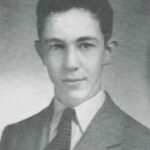 have been the only times we left the South Side. We went downtown, or went to the lake or rode our bicycles to the suburbs, but we never left the city. There was no automobile travel. We never got into Wisconsin or I never made it into Michigan. We were all Sox fans. I went to Wrigley Field once. I had some cousins from Boston. Even before we got to that point, I was thinking how localized we were. We didn’t get out. We certainly knew this area. We spent a lot of time just walking through neighborhoods.”
have been the only times we left the South Side. We went downtown, or went to the lake or rode our bicycles to the suburbs, but we never left the city. There was no automobile travel. We never got into Wisconsin or I never made it into Michigan. We were all Sox fans. I went to Wrigley Field once. I had some cousins from Boston. Even before we got to that point, I was thinking how localized we were. We didn’t get out. We certainly knew this area. We spent a lot of time just walking through neighborhoods.”
Growing up the priesthood carried a sharp personal and emotional resonance. Many of the boys he knew at St. Leo openly pondered becoming a priest. “It was a big deal for an [Irish] family to have somebody who was a priest. It was a very Catholic environment. In a sense, it was as though becoming a doctor or lawyer; it was much more highly celebrated and honored.” He always imagined he’d be in the armed services, fighting for his country. With the war over, there were other possibilities. College had always appeared a feint possibility. Everything was changing.
“I went down and enlisted in the Marine Corps in mid-July [1945]. They gave me a day to report. The war ended. For about six months, I kept getting letters from the Marines.” He wound up instead spending a year at a Franciscan retreat center in the western suburbs. Realizing he had to get serious about the rest of his life, Fr. Leahy applied himself seriously and tenaciously. He stayed a year there, immersing himself in Latin and Greek. The experience was gratifying and illuminating. He joined the Dominican Order and went to Loras College, in Loras, Iowa, for two years.
Life of the mind
This was the beginning of his novitiate, a period of intense training and preparation in advance of taking vows in deciding whether they are suitable for the religious life. “There are no studies involved,” he says. “It’s about a very intense, contemplative period of your life. You get up at 5:30 in the morning. We chanted for about 45 minutes. Then we had a solemn high mass. We stayed in the church for about an hour and fifteen minutes. Classes started at 8 o’clock. We had four hours of classes, all taught in Latin. We had a half hour for lunch. Then we chanted for another hour. We had an hour for recreation. We studied from three to five and then we went back to church, for an hour and we chanted. We had dinner. Then we had another hour of recreation. From 8 to 10, we studied. You went to bed at 10:30. Then the next morning, it all started again.
The Dominican Order was in River Forest, near Division and Harlem. Fr. Leahy left his South Side home in 1948 and never returned to his neighborhood until 1955. He studied Aristotle, Plato and other Greek philosophers for three years. He studied theology for four years, principally the works of St. Thomas Aquinas. “If you were from Chicago, you could go home once a month for lunch on Sunday,” says Fr. Leahy, smiling.
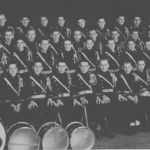 He missed serving in the war, but it effectively followed his own path. “The war ended and I got home and there was a large influx of veterans. Half of the guys in my class were [veterans]. Our class had about 15 or 20 candidates. The class behind us, because of the influx of veterans, was huge, about 40 or 50 candidates. The whole idea of the novitiate year was to give you a chance to think about whether you really wanted to go through with this and give the religious community a chance to see whether we really wanted this person. It was a year of really thinking about it, praying about it and wondering if you should go on and your superiors deciding whether you were ready for that. There was give and take on both sides.”
He missed serving in the war, but it effectively followed his own path. “The war ended and I got home and there was a large influx of veterans. Half of the guys in my class were [veterans]. Our class had about 15 or 20 candidates. The class behind us, because of the influx of veterans, was huge, about 40 or 50 candidates. The whole idea of the novitiate year was to give you a chance to think about whether you really wanted to go through with this and give the religious community a chance to see whether we really wanted this person. It was a year of really thinking about it, praying about it and wondering if you should go on and your superiors deciding whether you were ready for that. There was give and take on both sides.”
A religious life was not something taken lightly. It had huge ramifications, especially for young men of the generation of Fr. Leahy. He was ordained in 1955. He acknowledges that the priesthood constituted a gamble of sorts. A man who enters a field or a profession that does not satisfy him had greater options to leave or try his hand at something else. “I never questioned it seriously until about ten years later. That’s when you start to have second questions. In those days when you entered the priesthood it was for life. Very few left because the church came down so heavily on people. If you left, it was almost the equivalent of … turning your back on God.”
Beginning with the Second Ecumenical Council of the Vatican, or Vatican II, the culture of the church and the priesthood was transformed. “In my province of the Dominican Order, from 1942-1960, out of three or four hundred men, maybe two or three had left. After 1962, great numbers left because it was no longer considered a terrible disgrace to leave. You had the freedom to leave.” Fr. Leahy gave consideration to leaving the priesthood. In reflection, he told himself: It’s a great life. I’m doing the best I can with it. God loves me, and I’ll just hang in there.
Fr. Leahy taught at Fenwick High School in Oak Park from 1956 to 1959. At the beginning of the 1960s, Fr. Leahy left Chicago. He spent five years at a parish in New Orleans, where he helped organize the largest youth organization in the South. This initiated the next phase of his life, a time increasingly given to travel, counseling and academia. After spending several years in Madison, Wisconsin, Fr. Leahy decamped for the University of California in Berkeley in 1969 to pursue postgraduate work in psychology.
Unusual directions
The university was undergoing its own seismic cultural shifts because of the burgeoning student protests against American escalation of the Vietnam War. Fr. Leahy took a flier that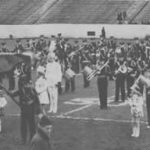 altered his life for the next 15 years. “I was studying for my doctorate at the University of California. I was in my third year of the program and I was really getting tired of it. I was getting old. A guy told me there was a bishop in Monterey looking for a prison chaplain.” He was desperate to get out of academia.
altered his life for the next 15 years. “I was studying for my doctorate at the University of California. I was in my third year of the program and I was really getting tired of it. I was getting old. A guy told me there was a bishop in Monterey looking for a prison chaplain.” He was desperate to get out of academia.
From 1977 to 1999, Fr. Leahy worked as a prison chaplain. “I got to know all sorts of famous and infamous people. I spent 14 years in a men’s prison at the California Institution for Men [in Chino, California] and one year in a women’s prison. That was really the most interesting part of my career,” he says.
He dealt often with violent, unrepentant people. He sought to give them some sense of humanity, however fleeting, to mitigate their personal circumstances. “Basically I always tried to make their lives a little easier by simply being there if they wanted to talk or getting a hold of their families and leaving messages, just trying to make their day a little lighter.
“You get your inmate who’s your secretary and we called them clerks. One of my secretaries became a religious brother after he left prison. I never had the idea of converting anybody. I felt it was important to be there when they needed me and to provide the regular services.
During his time the Women’s Institute, Fr. Leahy came in contact with Susan Atkins, Patricia Krenwinkel and Leslie Van Houten, three members of the “Manson Family,” the notorious former cult whose darkly amoral killing spree in the summer of 1969 in Los Angeles stunned the country.
“They were very arrogant and nasty girls. They were condemned to death [later overturned]. California had only one women’s prison. There was a great old priest there. He was a 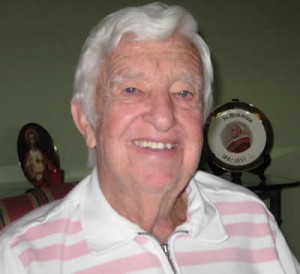 sweet old man. He never did anything really; he just came by every day and gave them a cookie. He was a sweet, old Irish guy with a brogue. They fell in love with them. He had a tremendous influence on them. It’s hard to believe this. The influence of two shepherds, the good shepherd and the bad shepherd. Charlie Manson was the bad shepherd; this man completely wiped the bad influence. Two of the three I was really impressed with. They changed and became really model inmates.
sweet old man. He never did anything really; he just came by every day and gave them a cookie. He was a sweet, old Irish guy with a brogue. They fell in love with them. He had a tremendous influence on them. It’s hard to believe this. The influence of two shepherds, the good shepherd and the bad shepherd. Charlie Manson was the bad shepherd; this man completely wiped the bad influence. Two of the three I was really impressed with. They changed and became really model inmates.
“They got caught up under the influence of this charismatic guy. They did these horrible murders. I guess the point I’m making, they were redeemed. I’d hear confessions and say mass.”
After leaving the prison system in 1992, Fr. Leahy volunteered at Camp Pendleton Marine Corp for the next several years. He returned to Chicago in January 2002. Technically retired, he says Mass on Saturdays and Sundays at St. Barnabas Church in Beverly. Twice a month he has a rendezvous with friends and classmates from Leo. They tell stories, reminisce about their own remarkable intersection with history—the Depression, World War II—that marked their time. “The best friends I ever made and the longest friends I’ve ever had have been guys at Leo,” he says.
Is there a way I could get in touch with Maurice Leahy? I think he’s family.thanks bridget O’Donnell